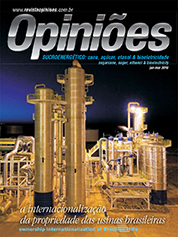Pedro Isamu Mizutani
President of Cosan - Sugar and Ethanol
Op-AA-23
Brazilian sugarcane under international spotlights
Competitive differentials of the Brazilian sugar-based energy market caught the attention of the world the moment the country consolidated itself as one of the largest players in the industry. Using renewable high energy performance raw material, this industry came under the Brazilian and international spotlights for being part of the solution in this new scenario of sustainable development.
Techniques employed by Brazil in producing sugar and ethanol from sugarcane are so effective that its application in other continents such as Africa is already under consideration. South Africa, for example, has already done advanced studies on the production of biofuels from sugarcane, with technology similar to that of Brazil, but adapted to local realities.
The transference of technology shows that the pioneer work implemented by Brazil aggregates value and provides clean supply solutions to different parts of the world. Furthermore, delegations from countries such as Japan, Sweden, Saudi Arabia, Holland, Germany, Mexico and the United States frequently visit the country to check on the quality of our production.
Initiatives such as these show that the advantages of Brazil go beyond the fact that the country is located in a region with a favorable climate. The industry knew how to make use of its human and technological potential for developing solutions adapted to our reality, including flexibilization in the production of the mills, which can predominantly produce either ethanol or sugar, according to market demand.
In addition, electric power produced from bagasse and sugarcane straw can reinforce the Brazilian energy matrix, particularly in the dry season, as a competitive and renewable source. With a consolidated and promising development, the interest of multinational companies and foreign investors in the Brazilian sugar-based energy market is only natural.
After all, the products use state-of-the-art technology, efficiently implemented by major players such as Cosan. In recent years, the international market acknowledged Brazilian ethanol as an important source of clean, sustainable and economically feasible energy. In 2008, the Cosan Group was one of the companies that closed a distribution deal with Sweden, for the first ethanol shipment that had to meet sustainability criteria.
This trade deal resulted from a pioneer contract celebrated by the Brazilian mills Alcoeste, Cosan, Guarani and NovAmérica — today belonging to the Cosan Group – with Swedish company Sekab, the largest buyer of Brazilian ethanol in Europe. It is important to point out that the mills were capable of meeting the European consumer requirements, without changing their ongoing operational practices.
Production following sustainability criteria was an essential item also in the celebration, last year, of an important partnership with Mitsubishi, to supply ethanol for use in the production of EBTE, an oxygenant agent that makes gasoline burn in a cleaner and more complete way. In this composition, ethanol replaces methanol, providing the end product a cleaner and more sustainable characteristic, without altering performance.
Apart from ethanol, Brazilian sugar also played an important role in international supply, notably after the Indian harvest failed. Being a large producer, consumer and exporter, India began importing the product, whose inventories were at low levels throughout the world. Alert to this supply need, Cosan in the first semester of its harvest, exported 12.7 million tons of the product, a volume 26.4 % higher than in the same period of the previous harvest, with India as the main destination, followed by Saudi Arabia and Russia.
All these positive events only reassure us that companies performing in an integrated way, with focus on innovative and quick solutions, always alert to the human element, with disciplined expediency, and capable of developing the safety potential of their operations, will always enjoy a leading edge. With this posture, apart from the respect for the pioneer work performed by Brazilian professionals, the national players need not fear foreign investment that can greatly contribute to even further leverage the business.
In the capacity of holders of a matured technique that brings about efficient results, Brazilian companies are well equipped to work in partnership with possible foreign investors, sharing the benefits of a clean and renewable production, in tune with the environmental concerns of our time.




